BANGLADESH
Democratic Deficit

Bangladeshi President Mohammed Shahabuddin (L) watches as Prime Minister Sheikh Hasina (2R) signs documents after being sworn in for her fifth term at the Presidential Palace in Dhaka on January 11, 2024. Hasina, largely unchallenged by Bangladeshi election monitoring mechanisms, has consolidated power through undermining democratic structures. Credit: Munir Uz Zaman / AFP
The clamour for democratic transition in Bangladesh quietened with the reconsolidation of power by the ruling Sheikh Hasina-led Bangladesh Awami League (AL), through the January 7, 2024 election, which was boycotted by the main opposition Bangladesh Nationalist Party (BNP) and its allies.
Sheikh Hasina’s regime, since she came to power in 2008, gradually began to draw criticism for being authoritarian. The government’s actions came under growing global scrutiny as the 2014 and 2018 national elections were not deemed fair by Western liberal democracies. The United States even imposed visa restrictions and threatened tougher action if the country deviated further from democracy by failing to hold a fair and participatory election.
While Bangladesh was under the international spotlight, the government seemed to be avoiding more attention on the freedom of speech situation in Bangladesh in 2023, ahead of the general elections. With the election over and Sheikh Hasina securing her fifth term through an uncontested vote on January 7, 2024, the old normal is back.
The election outcome is poised to further consolidate unchecked power, tightening the government’s control over the media.
Booming industry, declining freedom
The media industry in Bangladesh is vibrant and growing, with 45 TV channels, 28 FM and community radio stations, 1,248 daily newspapers and several online news portals, many still unregistered. Till January 31, 2024, the Press Information Department (PID) had provided registration certificates to some 208 online news portals and online editions of 168 daily newspapers.
On February 25, 2024, Law, Justice and Parliamentary Affairs Minister Anisul Haq said in parliament that the Ministry of Information and Broadcasting had given permission to another 213 online news portals, 196 daily newspapers online editions and 17 private television channels online portals.
However, even as the number of media outlets has grown over the past two decades, media freedoms are being steadily eroded.
The ownership of most print and electronic media houses is corporatised and linked to powerful business houses and politicians, who in turn have interests in banks and financial institutions, insurance, energy and the real estate sector. There are often conflicts of interest with news operations, but the media is obliged to serve their owners’ business interests and political agendas.
Another notable feature is family ownership of the majority of media, with owner-editors at the helm. More often than not, the owners are connected with political parties directly or indirectly. This situation persists because the entrepreneur’s relationship with the government becomes a determining factor in obtaining licences. Sometimes politicians themselves become owners or lobby for a certain outlet. Media is thus sharply divided along political lines.
Newspapers largely depend on advertisements from both the government and private entities; one rife with corruption and the other with vested commercial interests. According to a study conducted by Management and Resources Development Initiative (MRDI), advertisement spending in Bangladesh is around BDT 20-30 billion (about USD 275 million). The government distributes advertisements on whim, while it pressurises private agencies to withhold advertisements to those critical of the government.
Despite the seemingly booming media, most working journalists and media workers are deprived of fair wages. Moreover, the electronic and online media is yet to be brought under the national wage structure. While the government sets – at irregular intervals – a national minimum salary structure for newspaper employees, few media outlets operationalise it. Journalists are demanding that newspaper owners implement the 9th wage board award and pay the dues of journalists and have sought the government’s intervention to realise the dues amounting to about BDT 11 billion (about USD104 million). Journalists are now on the street demanding the setting up of the 10th wage board to increase the salary of journalists and other newspaper employees.
Physical attacks or fear of retaliation and lack of access to information also cripple the journalist’s ability to disseminate information and ensure the people’s right to know.
Media Rights Violations
Killings
Arrests
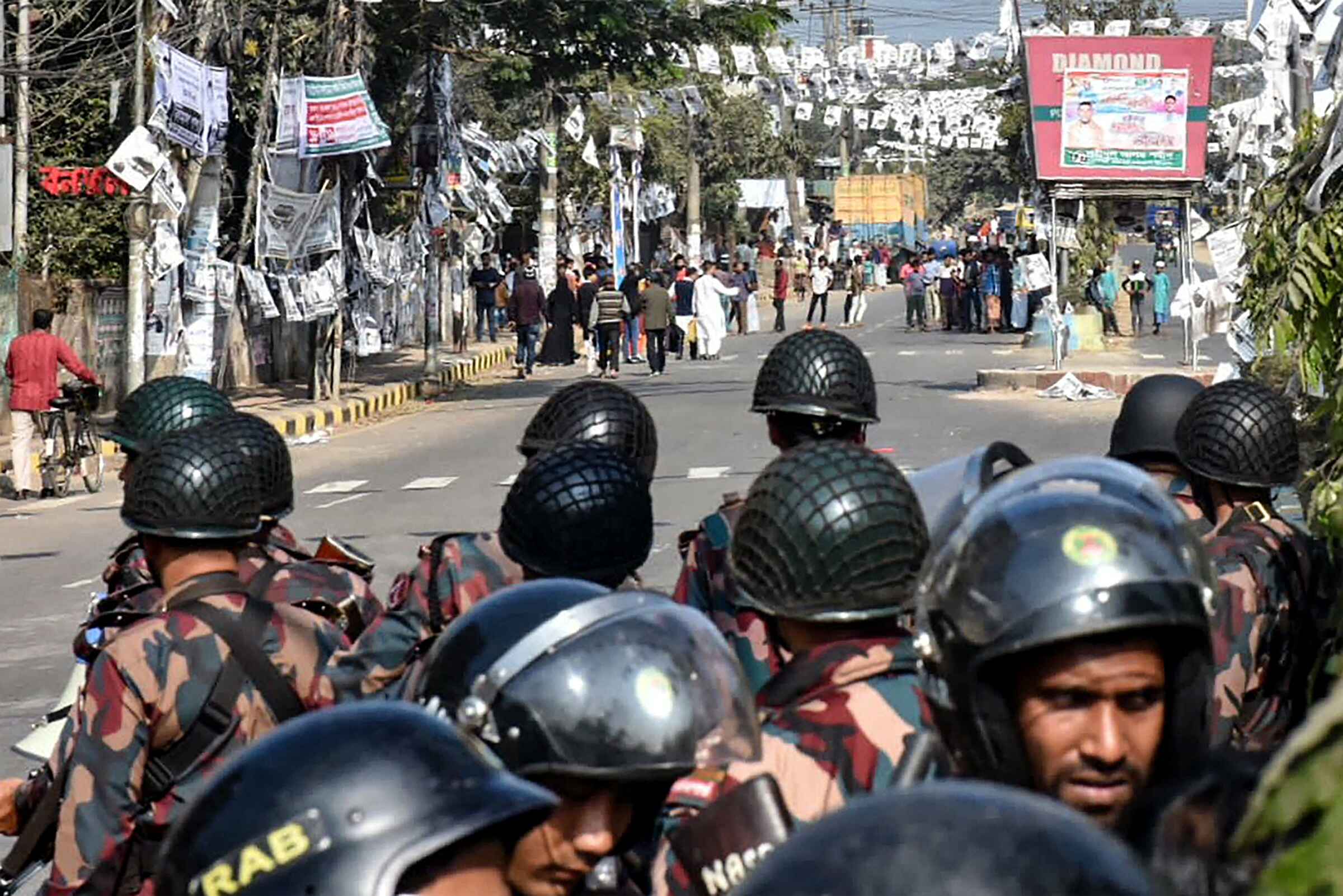
Rapid Action Battalion (RAB) personnel stand guard to disperse opposition political activists protesting the general elections in Chittagong on January 7, 2024. Elections in Bangladesh were marred by violence, with at least 31 journalists facing violence of some at protests and polling sites. Credit: AFP
Facing risk
The country counted at least 10 unnatural deaths of journalists, two of which are registered as murder cases. Eight other cases are registered as accidents, of which at least three deaths are suspected to be murders according to media reports.
The deaths include that of Abu Selim Mia, 52, the Jhenaidah correspondent of the Daily Jobabdihi on December 20, 2023; Monjur Hossain Milon,52, the Gazipur correspondent of Daily Karatoa and Daily Bhorer Darpan and also the editor-in-chief of weekly Gazipur Darpan on August 4, 2023; and Sahara Akter,35, a photojournalist of daily Alor Jagat in Netrokona on September 20, 2023.
Deaths reported by the media as road accidents included Imran Hossain,30, Rangunia Upazila Correspondent of Daily Amader Somoy in Chattagram district who died in a road accident on December 29 and Yunus Ali, 45, Lalmonirhat correspondent of two dailies —Somoyer Kanthaswar and Swadesh Pratidin on September 17, 2023. But there are some suspicions that these could be murders.
Two young journalists Tushar Hawladar and Avisruti Shastri lost their lives in the devastating Bailey Road blaze in Dhaka on February 28, 2024 that claimed 46 lives.
Golam Rabbani Nadim, 42, the Jamalpur district correspondent of Banglanews24.com and also the Bakshiganj upazila correspondent of Ekattor TV, was attacked allegedly by the followers of a local upazila chairman on June 14, 2024 and died of his injuries the following day.
Ain o Salish Kendra (ASK), a non-government organisation that monitors cases of violations and human rights abuses, reported 517 cases of different kinds of attacks on journalists from May 1, 2023 to March 31, 2024.
Over the last three months, 81 journalists were subjected to torture, harassment, threats, lawsuits, and faced obstructions while carrying out professional duties, as per data from ASK. Most of the attacks came from the government and its supporters, the rights body says.
On election day, at least 31 journalists faced violence while journalists of some prominent international media were allegedly denied visas to enter the country to cover the elections.
On November 27, 2023, an anti-government rally turned violent and at least 30 journalists reporting from the ground became victims of brutal attacks, mostly by the opposition BNP activists.
A culture of impunity persists with the authorities’ failure to make progress in the investigation into the 2012 murder of journalist couple Sagar Sarowar and Meherun Runi. With the Rapid Action Battalion having deferred the submission of its probe report to court over 100 times, the wheels of justice indeed grind slowly.
Desperate rural journalists
A suspicious death in a rural press club in Southern Barguna district tells the story of what is wrong with journalism in rural Bangladesh. Talukder Masood, correspondent of the vernacular daily Bhorer Dak was the district representative of Rajdhani Television and also an elected local government representative. He was attacked in a press club in Southern Barguna district, during an altercation over a carrom game and later succumbed to his injuries.
However, statements from both sides reveal that the horrific incident occurred in the backdrop of previous enmity over governance of the press club and its income. One version of the incident is that Masood received minor injuries during a scuffle inside the press club and died two weeks later due to cardiac arrest. While it is yet to be proved whether Masood’s death is a tragic accident, coincidence or murder, the incident reveals the unhealthy state of Bangladesh’s rural journalism.
There is no scope for district-level journalists to live solely on earnings from journalism. Like Masood and his killers, the livelihood of almost all the journalists in 64 districts and 495 upazilas (sub-districts) of Bangladesh is precarious. There are nearly 20,000 part-time journalists outside Dhaka, who are involved in other business for their livelihood. They do journalism as a part-time job or use their identity as journalists to exert influence on local administration, politics and other affairs. Their newspaper offices in Dhaka give them journalism identity cards; actually appointing them – most often unofficially – as advertisement collectors, entitled to a percentage from the advertisements. At times, they also send in news reports from the rural areas. President of Bagura Union of Journalists JM Rouf and General Secretary of Rangpur Press Club Merina Lovely confirmed the abysmal state of rural journalism in Bangladesh.
Every district or sub-district in Bangladesh has more than half a dozen press clubs, each ruled by a coterie with vested interests. As media owners do not pay their district or upazila correspondents, the ID cards that are offered in lieu of payment, are often misused. These are parts of a longer chain of corruption encircling the whole polity. At least 16 persons were arrested as “fake journalists” for committing crimes like extortion and deception by abusing the identity of journalists in eight different incidents in various parts of the country in the three months from January to March 31, 2024.
Amid this crisis of credibility, the law too hounds genuine journalists.
On election day, at least 31 journalists faced violence while journalists of some prominent international media were allegedly denied visas to enter the country to cover the elections.
As media owners do not pay their district or upazila correspondents, the ID cards that are offered in lieu of payment, are often misused.
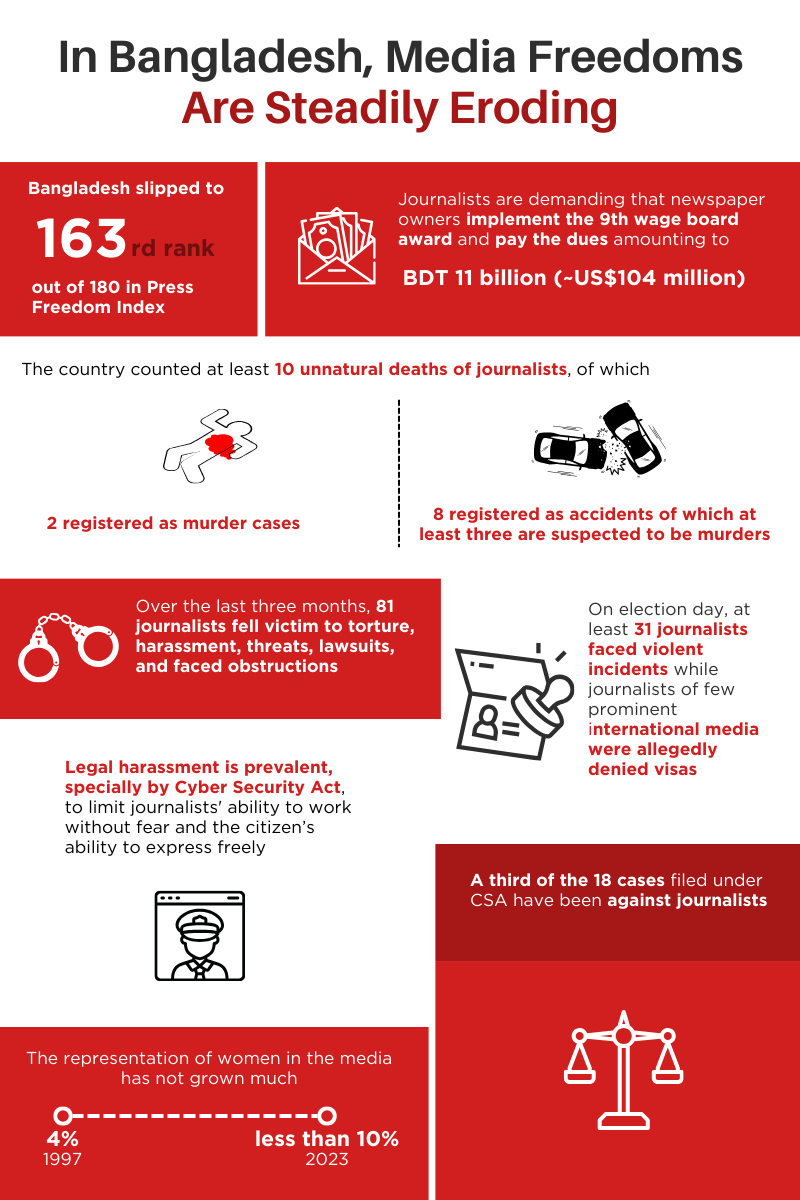
From DSA to CSA
Article 39(2) of the Constitution of Bangladesh allows for reasonable restrictions on freedom of the press on grounds of state security, friendly relations with other states, public order, decency or morality, contempt of court, defamation, and incitement to an offence. The country now has more than fifty laws that curtail press freedom.
Legal harassment is rampant, specially by a harsh cyber law, to limit journalists’ ability to work without fear and the citizen’s ability to express freely.
Drawing heavy criticism from home and abroad, the government replaced the Digital Security Act (DSA) with another law, the Cyber Security Act (CSA) passed on September 13, 2023. However, this was the proverbial old wine in a new bottle. The new law was enacted without sufficient changes in the provisions that make people’s right to expression punishable offences. This law is still a major tool to stifle critical voices.
While offences under 14 sections of the DSA were non-bailable, offences under four sections of the new law are non-bailable. These sections are related to intrusion into key information infrastructures, damaging computer systems, cyber terrorist activities, and hacking related crimes.
The CSA allows officers of the rank of police inspector to search and arrest anyone without any warrant. Earlier the DSA had empowered sub-inspector-level officers to do the same. However, if a false case is filed, it is considered as a crime and provisions for punishment have been retained in the new law. The pending cases will run under the DSA according to a provision incorporated in the new law.
The law empowers the government to remove and block data from digital media if deemed to “affect the cohesion, security, defence, religious, or economic activities in the country.”
Some opposition lawmakers opposed the bill saying the CSA will be the same as the DSA, which was one of the most widely used tools for suppressing dissent and free thought. Law Minister Anisul Huq defended the new law on grounds that it has reduced punishment in various sections – there were were many non-bailable sections which are bailable in the new law. However, the provision under the DSA for three years’ imprisonment and fine not exceeding BDT 5 lakh (about USD 5000) or both for publishing defamatory news, has been replaced by a maximum fine of BDT 25 lakh (about USD 25000) under CSA. Failure to pay the fine will result in imprisonment for a minimum of three months and a maximum of six months.
Both the DSA and the CSA have a controversial approach towards the right to privacy. They also arm the state with unrestricted investigative powers. Like the DSA, the CSA too criminalises online defamation and imposes a substantially different punishment from that of the Penal Code 1860, raising a vital question of jurisprudence— whether the same act can be criminalised by two separate laws on the basis of its commission on two different platforms.
Both the DSA and the CSA penalise propaganda against the liberation war, hurting religious sentiments and tarnishing the image of the state. The wide scope of all these provisions potentially create scope for misinterpretation and abuse.
Since its enactment, at least 18 cases have been filed against 36 people under the new law from September 18, 2023 to February 24, 2024, with a third of the cases being filed against journalists. According to data from Dhaka-based independent think tank Centre for Government Studies (CGS), from May 1, 2023, at least 18 other journalists were charged under the DSA until the law was replaced by the CSA in September 2023. The more things change, it would appear, the more they remain the same.
Jailing of an Innocent
On February 29, 2024, a court in Dhaka acquitted Khadijatul Kubra, of all charges under the Digital Security Act (DSA), stating that there was no evidence to frame charges against her.
Khadijatul Kubra, a political science student at Jagannath University in Dhaka, was arrested under the DSA for hosting a Facebook webinar on the social media page ‘Humanity for Bangladesh’ in November 2020. A guest speaker made comments perceived to be critical of Bangladeshi authorities. Cases were filed against Khadija under the DSA on charges of anti-government propaganda and tarnishing the country’s image, and she was arrested in August 2022, almost two years after the event.
After repeated pleas to release her on health grounds – she has kidney disease – she was granted bail on November 20, 2023, she immediately headed to the university to appear for a scheduled examination.
Marking one year of her arrest on August 28 2023, Amnesty International’s Interim Deputy Regional Director for South Asia, Nadia Rahman, in a media release said, “The year-long incarceration and repeated denial of bail to Khadija is a travesty and flagrant violation of the right to freedom of expression in Bangladesh. She should be in university, studying for her degree, and not in jail waiting for her fate to be decided under a draconian law.”
While speaking to the media outside the prison on November 20, when she was released on bail, she said, “What I’ve experienced is completely unfair. I’ve spent almost 15 months in jail for no crime.”
Even though she is now free, there is no one to answer: ‘Who will give Khadija back 15 months of her life?’
Drawing heavy criticism from home and abroad, the government replaced the Digital Security Act (DSA) with another law, the Cyber Security Act (CSA).
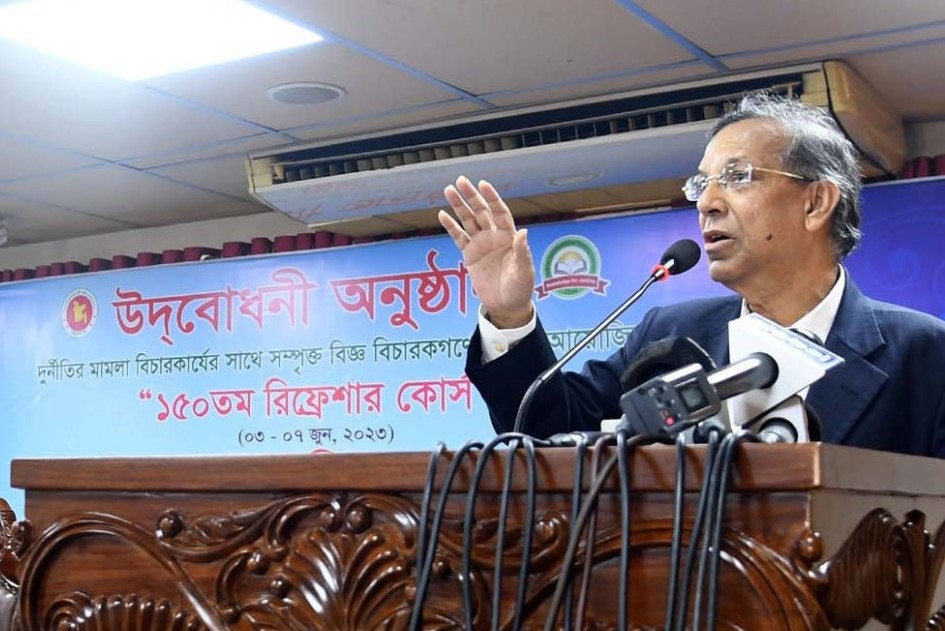
Bangladesh’s Law Minister Anisul Huq speaks at a press conference in June 2023. Press Freedom advocates have continued to criticise the misuse of laws in Bangladesh to target media professionals, despite 2023 efforts to replace the Digital Security Act with the purportedly improved Cyber Security Act. Credit: X
Falling indices
In the year under review, local and international organisations including the United Nations repeatedly urged Bangladesh to stop misuse of laws and protect the media’s right to operate freely and independently.
The World Press Freedom Index by Reporters Without Borders (RSF) ranked Bangladesh at 163 out of 180 in 2023 showing it to be the worst-performing country in South Asia. The new state minister for Information and Broadcasting Ministry Mohammad Ali Arafat denounced the Index and termed it “unacceptable, biased and deviated from the truth.”
Even Taliban-ruled Afghanistan was placed in a better position than Bangladesh in RSF rankings, which was questioned and termed as an exaggeration by many in Bangladesh.
The spectre of fake news
Disinformation, false propaganda and rumours on social media have emerged as challenges for journalism in the country.
Bangladesh has been trying to cope with economic pressures with dwindling forex reserves following the Covid-19 pandemic and Ukraine war. In this situation self-exiled blogger Pinaki Bhattacharya released a video with the rumour that banks in Bangladesh had become bankrupt and were on the verge of collapse. He urged millions of his followers in Bangladesh to withdraw money from the banks or lose their hard-earned savings. Many people acted on his ploy, thus exacerbating the economic crisis.
Misinformation and disinformation campaigns in Bangladesh are spread through various mediums, including social media platforms, online news websites and messaging apps. While serving as valuable communication and information dissemination tools, these platforms have also become breeding grounds for the rapid spread of false narratives and propaganda. Political actors, extremist groups and foreign entities often exploit these channels to manipulate public opinion, polarise communities and advance their own agendas.
The country is now grappling with the challenge of combating misinformation while safeguarding press freedom.
In some cases, the government itself is the source of misinformation campaigns. For example, soon after the national polls concluded in Bangladesh on January 7, 2024, a group of international observers termed the election totally “free and fair.” Pro-government news networks grabbed the chance and immediately published news with headlines such as “US observer calls election free and fair.” What was not revealed was that the so-called “independent foreign observers” were actually invited by the government to work as lobbyists for the ruling Awami League party.
The US embassy and other foreign missions in Bangladesh issued statements clarifying that their countries did not send any official election observation team to Bangladesh to observe the most recent election, but the damage had already been done.
The opposition BNP also used similar techniques. On October 28, 2023 a video surfaced on social media showing a man in a pink shirt seated at the BNP’s Nayapaltan headquarters, addressing a press conference. Flanked by the party leaders, the man in pink – Mian Arefy – introduced himself to the press as an advisor to US President Joe Biden and expressed the global superpower’s support for the opposition party in Bangladesh on behalf of the country’s president. As the ‘news’ went viral, the US embassy clarified to the media that the man was a US citizen with no relationship with the US government or its President. The police arrested Mian Arefy and some BNP leaders the following day on charges of conspiracy.
The proliferation of fake news, disinformation, and false propaganda for and against the government regularly create controversies. It has become even more virulent due to Artificial Intelligence (AI). Alongside, cyberspace is replete with hate speech and hate crime amid an uninformed citizenry, as well as bias and divisions based on politics, race, ethnicity, sexual orientation and religion.
The line between truth and misinformation is becoming blurred, posing a serious challenge to journalism. The most concerning consequences of this kind of misinformation and disinformation are incitement to violence and unrest. False propaganda and rumours about religious or ethnic minorities, political opponents or contentious issues are frequently escalating tensions and leading to communal clashes or acts of vigilantism.
The country is now grappling with the challenge of combating misinformation while safeguarding press freedom. In some cases, the government itself is the source of misinformation campaigns.
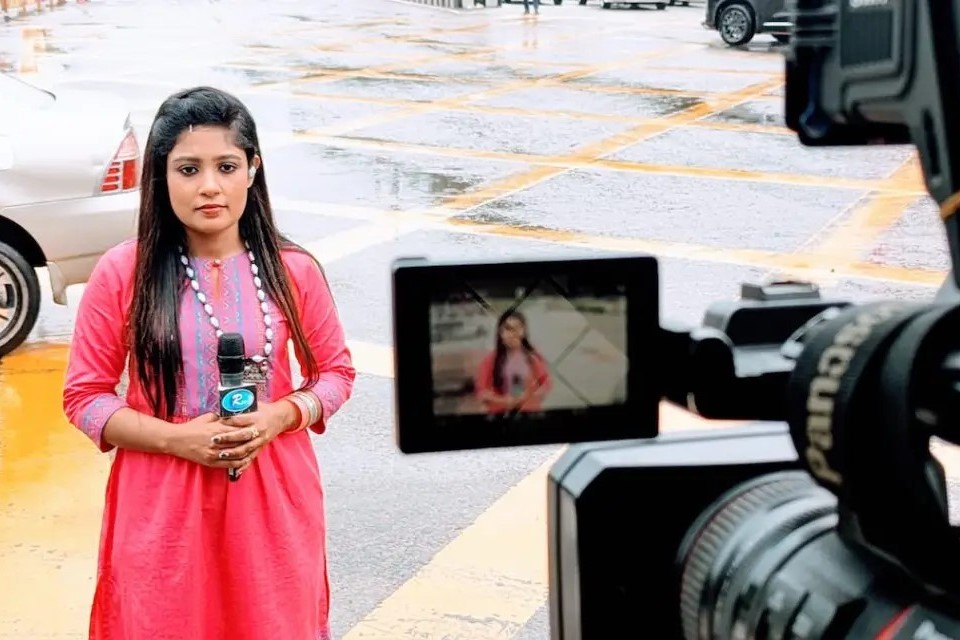
Journalist Adhora Yeasmein poses for a photo in 2023. Women in Bangladeshi media continue to face significant challenges in their professional lives, with barriers to leadership, coverage of gender issues, and a lack of gender considerations in the workplace conditions continuing to impact their careers. Credit: X
Still a minority
The representation of women in the media workforce in Bangladesh has not grown dramatically. From four per cent of the total media workforce in 1997, as per the Bangladesh Press Institute in 1987, to less than 10 per cent in 2023, according to a study by the Management and Resources Development Initiative (MRDI). There are around 1,000 female journalists working across Bangladesh.
Only two prominent newspapers and one mid-level publication are edited by women, who also happen to be wives of the previous editors or owners. In the private sector television channels, currently there are two women occupying high positions— one executive editor and one chief news editor. A few news editors are also women. While mid-ranking women managers in television are slowly rising in the ranks, a glass ceiling is very much in existence. The media in Bangladesh is still predominantly male-dominated.
Gender-related issues in newspaper reports are low in Bangladeshi media, where around 10 per cent of newspaper and online stories were found to have gender-insensitive words or phrases. There were also lapses in the protection of privacy of victims, children and rape-accused. Gender-based issues are found to be at the low end, and some topics like sexual violence by intimate partners have zero coverage. The majority of media houses have no gender policy.
Despite constitutional guarantees of equality, discussion on sexual minorities is still very sensitive and sometimes even dangerous in Muslim majority Bangladesh. Significantly, a trans person was appointed as a news presenter in a private television channel, for the first time in Bangladesh’s history.
Way forward
The country’s commitment under international legal instruments is in question in light of the weakening trends of freedom of expression across all platforms. There is a high level of fear which leads to self-censorship. Given the crimes against journalists, and the impunity for such crimes, it is an act of bravery to do journalism in Bangladesh. Despite this hostile atmosphere, journalism is alive, thanks to the commitment and dedication of journalists as well as some good investors in this field.
A more robust democracy, more transparency and accountability can make the media more fearless. Journalists’ role in investigating in the public-interest, exposing corruption and holding governments accountable will, in turn, strengthen democracy.
Given the crimes against journalists, and the impunity for such crimes, it is an act of bravery to do journalism in Bangladesh.
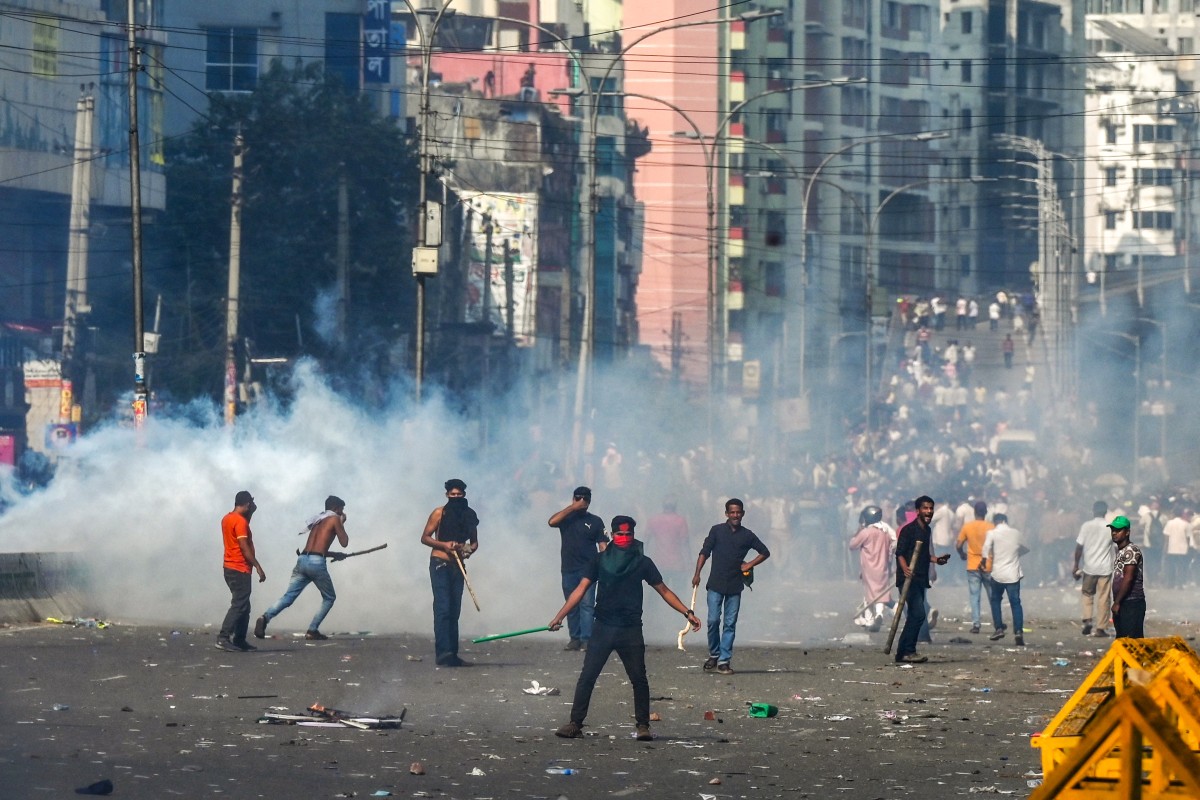
Bangladesh Nationalist Party (BNP) activists rally on October 28, 2023, demanding theresignation of Prime Minister Sheikh Hasina and the release of BNP Chair Begum Khaleda Zia in Dhaka. Facing violence, censorship, and a culture of impunity for crimes against journalists, working in Bangladesh’s media is an act of bravery in difficult times. Credit: Munir Uz Zaman / AFP
